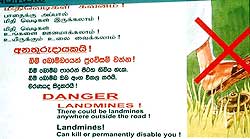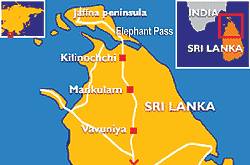 The dead coconut trees have lost their tops and stand like a forest of poles, a reminder of fierce artillery battles that once raged along this thin sliver of land joining the Jaffna Peninsula to the rest of Sri Lanka.
The dead coconut trees have lost their tops and stand like a forest of poles, a reminder of fierce artillery battles that once raged along this thin sliver of land joining the Jaffna Peninsula to the rest of Sri Lanka. Not a single house along the highway is intact. A herd of cattle, many with legs blown off, limps past red skull-and-bone signs warning of uncleared landmines. At Elephant Pass, where 2,000 guerrillas and soldiers died in a savage siege four years ago, rusting hulks of armoured personnel carriers and destroyed bunkers litter the ground.
The 20-year Tamil separatist war that claimed 80,000 lives has now been on hold for two years, and the tropical vegetation is reclaiming the ruins of war.
Jaffna Peninsula is under government control, defended by 50,000 troops, and the Tigers have set up their administrative capital in Kilinochhi, 50km to the south. At the edge of Tiger territory, there are all the trappings of an international border. Immigration officials put Tamil Eelam stamps on passports of visiting foreigners, and visitors have to set their watches half and hour ahead of Sri Lankan time.
The Liberation Tigers of Tamil Eelam have used the ceasefire period to create a separate state in the parts of northeastern Sri Lanka that is under their control. A customs service collects a strict tax on all incoming goods, a court system is busy settling disputes, smartly dressed Tiger police patrol intersections. The Tigers even have an economic wing which runs a chain of fast-food restaurants along the highway which serve spicy dishes with names like 'Landmine'.
 "You are here to see us as freedom fighters who are in the process of nation-building," the political leader of the Tigers, S Tamilchelvan tells a group of visiting journalists through an interpreter.
"You are here to see us as freedom fighters who are in the process of nation-building," the political leader of the Tigers, S Tamilchelvan tells a group of visiting journalists through an interpreter. "The peace process is on hold, but we are committed to ceasefire and want to start addressing the rehabilitation and reconstruction needs of our people." Tamilchelvan, a former guerrilla who was wounded in battle and walks with a stick, is the human face of the new Tigers. He led the negotiations with the government, and praises the role of the Norwegians to mediate and monitor the peace process.
But those talks have been stalled since November when President Chandrika Kumaratunga snatched security portfolios from Prime Minister Ranil Wickremasinghe's government, accusing him of giving away too much to the Tigers.
Southern Sri Lanka has enjoyed the benefits of two years of peace-there are no suicide bombings and tourism has rebounded. In government-held Jaffna, the main highway has been reopened, there is 24-hour power and the phones are working again. But one-third of the peninsula has been declared off-limits, displacing thousands of Tamil families. The peninsula's peacetime population of 800,000 is down to 500,000.
In Colombo, senior government official Bradman Weerakoon leads the government's rehabilitation and reconstruction efforts. He downplays the political rift between the prime minister and president, saying both are committed to peace. He is sure a way can be found to let the relief work to go ahead even if the talks are on hold.
 "The president is rocking the boat a little, but you don't make it capsize," says Weerakoon. Donors are pressuring the two to work out a compromise, and it looks like the president will agree to the prime minister heading a special security committee to handle the northeast while the president keeps the Defence Ministry.
"The president is rocking the boat a little, but you don't make it capsize," says Weerakoon. Donors are pressuring the two to work out a compromise, and it looks like the president will agree to the prime minister heading a special security committee to handle the northeast while the president keeps the Defence Ministry. International donors, led by Japan, have promised $4.5 billion to rehabilitate Sri Lanka of which $1.5 billion are supposed to be spent in the north and east. But donors are reluctant to disburse the money unless there is ironclad guarantee that the peace process is on track, and the government opposes handing the funds directly to the Tigers saying this would legitimise them. Tamilchelvan warns that the patience of the Tamils in the north is running out, and says his development coordination office for the northeast is perfectly capable of handling aid funds. "It is urgent to find a mechanism so that money can be funnelled to meet the humanitarian and infrastructure needs of the people, we can't wait for a political resolution in the south," he warns.
For now, it is clear that unless the power struggle between Wickremasinghe and Kumaratunga yields a clear victor, the peace process will be stuck. But donors, activists and civil society are trying their best to ensure that doesn't derail the ceasefire, and are trying to find a way to address urgent humanitarian needs.
One model could be the Asian Development Bank's involvement in demining and rehabilitating the main highway to Jaffna from the south. Civil contractors are working in Tiger territory, but have to give the rebels a cut. Dozens of international charities and INGOs are working with Tiger-run relief organisations on rehabilitation. The government has rebuilt its destroyed telecom towers in the north, and still pays for education and health even in Tiger areas.
But for many in Jaffna, all this help is too little, too late. "The rights of our people have been held hostage by politicians in Colombo," explains catholic priest Fr Bernard of the People's Council for Peace and Reconciliation in Jaffna. "They have always used the Tamil question as an issue to capture the southern vote bank."
 In Colombo, Paikiasothy Saravanamuttu of the Centre for Policy Alternatives agrees: "Chandrika has been doing exactly what her father and mother did: use the ethnic divide as an instrument in the political power struggles in the south. The Sinhalese have behaved as a majority with a minority complex."
In Colombo, Paikiasothy Saravanamuttu of the Centre for Policy Alternatives agrees: "Chandrika has been doing exactly what her father and mother did: use the ethnic divide as an instrument in the political power struggles in the south. The Sinhalese have behaved as a majority with a minority complex." In November, Chandrika Kumaratunga used her presidential powers to clip the wings of a prime minister from a rival party who she felt was walking away with the political reward for restoring peace. Having successfully sidelined her opponent, she then got her Sri Lanka Freedom Party to sign an alliance pact with the former militant Marxist Janata Vimukti Perumuna (JVP) to increase her numbers in parliament. Many in Colombo say the alliance is an extreme example of political expediency, since it was hitmen from the JVP who in 1987 assassinated Chandrika's husband, the charismatic actor-politician, Vijay Kumaratunga.
Although it has given up the armed struggle and is the third party in parliament, the JVP is vehemently opposed to the peace process and any talk of a federal solution to the Tamil problem.
Explains Saravanamuttu: "Power relations in the south need to be clarified for the peace process to move forward. We are in limbo, the Sri Lankan state is in paralysis with dual authority and a power struggle." Once that is sorted out, there must be a federal mechanism to devolve substantial autonomy to the north and east.
But for now, all that can be done, say peace activists, is to prevent the ceasefire from breaking and maintain the no war, no peace stalemate. Confidence-building measures need to be in place, people-to-people contacts must be restored, and massive rehabilitation drive launched to rebuilt infrastructure and allow Tamil families to return to their homes.
 The longer the stalemate drags on, there is a danger that other festering problems will surface, including the aspirations of Tamil-speaking Muslims in the eastern province. They have been left out of the peace process, but make up one-third of the population in the east. Although they speak Tamil, the Tigers are suspicious of their loyalty and they are not trusted by the Sinhalese either.
The longer the stalemate drags on, there is a danger that other festering problems will surface, including the aspirations of Tamil-speaking Muslims in the eastern province. They have been left out of the peace process, but make up one-third of the population in the east. Although they speak Tamil, the Tigers are suspicious of their loyalty and they are not trusted by the Sinhalese either. Geo-politics is also a factor. After a Tiger suicide bomber killed Rajiv Gandhi in 1991 to punish him for unleashing a war against them, New Delhi let Sri Lanka drift. This has allowed international players to step in to try to resolve the conflict. Officials in Colombo say that although they kept the Indians informed, sections of the New Delhi foreign policy establishment were not happy with the involvement of Norway, which they felt was acting as a proxy for the United States.
Now, India seems to be fully engaged again. Colombo and New Delhi are about to sign a defence pact, and economic ties have expanded dramatically. Having trained Tamil militants in camps in southern India in the 1970s, India now opposes a separate Tamil state in Sri Lanka.
Since the ceasefire, Colombo has allowed Indian Oil access to a big oil storage facility in Trincomalee and to run 100 gas stations throughout the island. The defence pact may allow the Indian Navy access to Sri Lankan ports in Jaffna and Trincomalee. Both Colombo and New Delhi are wary of the growing strength of the Sea Tigers, the naval wing of the LTTE and what this would mean to the sea lanes along India's southern coast.
In Jaffna, where many suffered bombings and killings by successive waves of the Tiger, Indian and Sri Lankan armies for the past 20 years there is a great longing for peace. But there is also a sense that the more things change in the politics of faraway Colombo, the more they remain the same.
Asked if the war could re-ignite, the pro-Tiger politician from the Tamil National Alliance, P Sampanthan, says: "It will just mean more misery for the Tamils. Resume conflict, and achieve what?"


